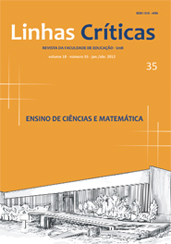The integration of women in science: scientist womendiscourses about their career choice
DOI:
https://doi.org/10.26512/lc.v18i35.3846Keywords:
Science, Women, Gender, Career choice, DiscoursesAbstract
This paper discusses the integration of women in science, based on the analysis ofsemi-structured interviews conducted with scientist women working in federal universitiesand in a research institute in the state of Rio Grande do Sul. In the article, we analyzethe reasons for choosing the scientific career, emphasizing the motivations, remarkablepeople and events that enabled this decision making. We seek to understand howwomen become included in the scientific milieu, built on androcentric and sexist pillars.In the analysis, we question the discourses and social practices that were and still areentailed by the respondents’ self-constitution, which teaches them ways of being andacting as women, and thinking and acting in relation to science.
Downloads
References
ARROYO, Miguel G. Ciclos de Desenvolvimento Humano e Formação de Educadores. Educação &Sociedade, Campinas, v. 20, n. 68, p. 143-169, dez. 1999. Disponível em: <http://dx.doi.org/10.1590/S0101-73301999000300008>. Acesso em: 10 out. 2011.
BELTRÃO, Kaizô Iwakami; ALVES, José Eustáquio Diniz. A reversão do hiato de gênero na educação brasileira no século XX. Cadernos de Pesquisa, v. 39, n. 136, p. 125-156, jan./abr. 2009.
BRASIL. Conselho Nacional de Desenvolvimento Científico e Tecnológico (CNPq). Diretório de Grupos de Pesquisa no Brasil, Plano Tabular. Disponível em: <http://dgp.cnpq.br/planotabular/>. Acesso em:10 jan. 2012.
BRENES, Anayansi Correa. História da parturição no Brasil, século XIX. Cadernos de Saúde Pública,v. 7, n. 2, p. 135-149, abr./jun. 1991.
BUJES, Maria Isabel. Criança e brinquedo: feitos um para o outro? In: COSTA, Marisa Vorraber (Org.).Estudos Culturais em educação: mídia, arquitetura, brinquedo, biologia, literatura, cinema... PortoAlegre: Ed. Universidade/UFRGS, 2000. p. 205-228.
CONNELLY, Michael e CLANDININ, Jean. Relatos de experiencia e investigación narrativa. In:LARROSA, Jorge et al. Déjame que te cuente. Barcelona: Laertes, 1995.
CORAZZA, Sandra Mara. Por que somos tão tristes? Revista Pátio,Ano VIII, n. 30, p. 51-53, mai/jul. 2004.
FELÃCIO, José Roberto Drugowich de. Conselho Nacional de Desenvolvimento Científico e Tecnológico.Pensando gênero e ciência. Encontro Nacional de Núcleos e Grupos de Pesquisa ”“ 2009, 2010/Presidência da República. ”“ Brasília: Secretaria Especial de Políticas para as Mulheres, 2010, p. 45-52.
FOUCAULT, Michel. A ordem do discurso. 11. ed. São Paulo: Loyola, 2004.
_____. Microfísica do poder. 22. ed. Rio de Janeiro: Graal. 2006.
GALIAZZI, Maria do Carmo et al. Objetivos das atividades experimentais no ensino médio: a pesquisa coletiva como modo de formação de professores de ciências. Ciência & Educação, v. 7, n. 2, p. 249-263. 2001.
GUIMARÃES, Valter Soares. Formação de professores: saberes, identidade e profissão. 3. ed.Campinas/SP: Papirus, 2006.
HALL, Stuart. A identidade cultural na pós-modernidade. 10. ed. Rio de Janeiro: DP&A, 2005.
HARAWAY, Donna. Saberes localizados: a questão da ciência para o feminismo e o privilégio da perspectiva parcial. Cadernos Pagu. Campinas, n. 5, p. 7-41. 1995.
HARDING, Sandra. A instabilidade das categorias analíticas na teoria feminista. Estudos Feministas,n. 1, p. 7-32. 1993.
HENNING, Paula Corrêa. Efeitos de sentido em discursos educacionais contemporâneos: produção de saber e moral nas Ciências Humanas. 2008. 282 f. Tese (Doutorado em Educação) ”“ Programa de Pós-Graduação em Educação, Universidade do Vale do Rio dos Sinos, São Leopoldo, 2008.
KRASILCHIK, Myriam. O professor e o currículo das ciências. 4. ed. São Paulo: EPU, 2006.
LARROSA, Jorge. Narrativa, identidad y desidentificación. In: ______. La experiencia de la lectura. Barcelona: Laertes, 1996. p. 461-482.
______. Tecnologias do eu e educação. In: SILVA, Tomaz Tadeu da. (Org.) O sujeito da educação:estudos foucaultianos. 5. ed. Petrópolis/RJ: Vozes, 2002.
______. Notas sobre narrativa e identidad. In: Abrahão, Maria Helena M. Barreto (Org.). A aventura(auto)biográfica: teoria e empiria. Porto Alegre: EDIPUCRS, 2004. p. 11-22.
SCHIEBINGER, Londa. O feminismo mudou a ciência 2001?São Paulo: EDUSC, 2001.
SILVA, Tomaz Tadeu da. Currículo e identidade social: territórios contestados. In: ______. (Org.).Alienígenas na sala de aula: uma introdução aos estudos culturais em educação. 6. ed. Petrópolis/RJ:Vozes, 2005. p. 190-207.
TABAK, Fanny. O laboratório de Pandora: estudos sobre a ciência no feminino. Rio de Janeiro: Garamond, 2002.
TOSI, Lucia. Mulher e Ciência: a revolução científica, a caça à s bruxas e a ciência moderna. Cadernos Pagu. Campinas, n. 10, p. 369-397, 1998.
VELHO, Léa; LEÓN, Elena. A construção social da produção científica por mulheres. Cadernos Pagu. Campinas, v. 10, p. 309-344, 1998.
WOODWARD, Kathryn. Identidade e diferença: uma introdução teórica e conceitual. In: SILVA, Tomaz Tadeu da. (Org.). Identidade e diferença: a perspectiva dos Estudos Culturais. 4. ed. Petrópolis/RJ:Vozes, 2005. p. 7-72.
WORTMANN, Maria Lúcia Castagna; VEIGA-NETO, Alfredo. Estudos culturais da ciência & educação.Belo Horizonte: Autêntica, 2001.
Downloads
Published
How to Cite
Issue
Section
License
Copyright (c) 2016 Linhas Críticas

This work is licensed under a Creative Commons Attribution 4.0 International License.
Authors who publish in this journal agree to the following terms:
-Authors maintains the copyright and grants the journal the right of first publication, the work being simultaneously licensed under the Creative Commons Attribution License which allows the sharing of the work with recognition of the authorship of the work and initial publication in this journal.
- Authors are authorized to enter into additional contracts separately, for non-exclusive distribution of the version of the work published in this journal (eg publish in institutional repository or as a book chapter), with acknowledgment of authorship and initial publication in this journal.
-Authorers are allowed and encouraged to publish and distribute their work online (eg in institutional repositories or on their personal page) at any point before or during the editorial process, as this can generate productive changes as well as increase the impact and the citation of published work (See The Effect of Free Access).



